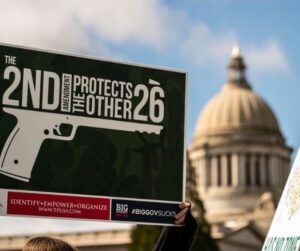The Supreme Court ruling in New York Rifle & Pistol Association v. Bruen is already paying dividends for gun rights advocates. In the wake of the court’s decision, Democratic politicians in states like California, New York, and others hurried to pass additional gun control legislation to subvert the impact of the ruling. But now, lower courts have been striking down existing gun restrictions left and right. This could indicate that even the new laws passed in these blue states might be on borrowed time.
Bruen Leads to Gun Rights Victories
A new academic analysis of lawsuits challenging gun control laws has been published with surprising revelations. Jake Charles, an associate professor at Pepperdine University’s Caruso School of Law, shows that courts have already applied the 2022 Bruen case to strike down more laws than the landmark 2008 case, District of Columbia v. Heller. Charles writes that numerous suits filed against various gun control laws relying on Bruen have already succeeded in federal court. Mr. Charles does not analyze this trend with glee – quite the opposite, he laments it and proposes ways for legislatures to be more successful in hurdling the latest obstacle (Bruen) to implementing more restrictive gun control laws.
Professor Charles wrote:
“[W]hen legislatures pass new gun laws, they ought to be explicit about four types of evidence for the law’s constitutionality that track Bruen’s new demands: the purpose for the law, the expected burden on armed self-defense, the precise nature of the problem to which the law is directed, and the historical tradition from which the law springs.”
Stephen Gutowski of The Reload says that while the Heller case established an individual’s right to bear arms, it did not provide a clear framework for future Second Amendment cases. Meanwhile, Bruen struck down a concealed-carry permitting regime and set specific guidelines for deciding gun cases. The new report found that gun-rights advocates have a higher success rate since Bruen, with 14.6 percent of claims succeeding, compared to fewer than 10 percent in the four years following Heller.
However, the success rates vary depending on the type of claim being made. Challenges related to gun licensing or defaulting private property to be off-limits for gun carry have won every time. In contrast, challenges to commercial regulations, the National Firearms Act, unlawful gun use, sentence enhancements, and bail conditions have failed each time. Criminal claims also won less often than civil claims, and there was a significant difference in how lower courts handled different issues, according to the report.
What’s the Difference Between Heller and Bruen?

(Photo by David Ryder/Getty Images)
District of Columbia v. Heller addressed the interpretation of the Second Amendment and the individual’s right to keep and bear arms. The case was brought before the Supreme Court by a group of individuals challenging the District of Columbia’s strict gun control laws, which effectively banned the possession of handguns in the city. The court’s decision in favor of the plaintiffs ultimately established that the Second Amendment protects an individual’s right to possess a firearm for lawful purposes, such as self-defense in their home.
The court’s ruling in Heller had significant implications for gun rights advocates, as it was the first time the Supreme Court affirmed an individual’s right to own a firearm. It also established that the right to bear arms was not solely tied to service in a state militia, as previously interpreted by lower courts. The Heller decision remains a critical precedent in interpreting the Second Amendment and the scope of gun ownership rights in the United States.
On the other hand, Bruen addressed the constitutionality of New York’s onerous handgun licensing scheme. The New York State Rifle & Pistol Association brought the case forward, challenging the state’s requirement for individuals to demonstrate a “proper cause” for carrying a concealed firearm in public. The association argued that the requirement violated the Second Amendment’s right to bear arms and imposed an undue burden on gun owners who wished to carry their weapons outside their homes.
In a 6-3 decision, the Supreme Court ruled in favor of the New York State Rifle & Pistol Association, finding that the “proper cause” requirement was unconstitutional. The majority opinion, written by Justice Alito, stated that the Second Amendment protects the right of individuals to carry handguns for self-defense outside their homes and that the New York State law imposed an unjustifiable burden on that right. This ruling effectively ended the existence of “may issue” states, which required people to prove they had a valid reason for obtaining a license to carry.
Not Everyone Is Happy About This
Of course, those who support more gun restrictions are not exactly celebrating this news. Charles argued that the Bruen ruling might encourage lower courts to strike down other gun regulations by creating an unworkable and overly broad standard. Nevertheless, those in favor of gun rights welcomed the trend. If this news is any indication, this is just the beginning. As LN has reported, numerous gun rights advocacy groups have and continue to file lawsuits challenging gun laws based on the Bruen decision. They vowed to challenge the myriad of anti-gun laws in blue states with heavy restrictions on gun ownership.
Because of the Supreme Court’s ruling, it will be far more difficult for officials to limit gun rights further. Indeed, these lawsuits will likely make it easier for responsible Americans to arm themselves over the long term. So far, this has already shaped up to be a massive win for those who value the Second Amendment.
Do you have an opinion about this article? We’d love to hear it! If you send your comments to [email protected], we might even publish your edited remarks in our new feature, LN Readers Speak Out. Remember to include the title of the article along with your name, city, and state.
Please respect our republishing guidelines. Republication permission does not equal site endorsement. Click here.

